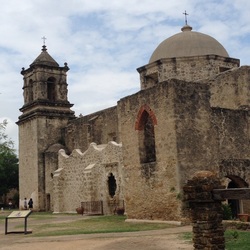inPurpose
Mission Matters
History offers us important lessons, which serve to inform our present and guide our path into the future. To discover the real lesson hidden “inside” a historical event, however, often requires digging beneath the surface.
Texas history is rich with stories of conquest, conversion, conflict, fierce determination and, ultimately, independence. At the heart of that history are the Spanish Missions; some 26 of them were established and operated by Catholic Missionaries across the territory that is now the State of Texas. Six of those were situated along the San Antonio River beginning in the early 1700’s; the most historically famous of them was the first one to be developed in that region. It was named the San Antonio de Valero Mission; you’re more likely to recognize it as “The Alamo”, the site where a garrison of Texan soldiers died in 1836 defending the outpost against the Mexican Army.
Some may not realize that the original mission of the San Antonio de Valero Mission ended approximately 40 years before the 13 day siege at “The Alamo”, which made the site famous. The Mission was “secularized” in the late 1700’s and the Mexican Army ended up using the site as a fort during their own fight for independence from Spain. The location ultimately became known and honored for a very different reason than it was first established. Mission Matters.
It was extraordinarily difficult in those frontier days to control vast lands from afar. The Spanish Missions represented a massive and coordinated effort to do just that. Some locations were just too remote and challenging, however, to sustain for their original purpose. Mission Matters, but other factors intervened and changed the course.
Just down the San Antonio River from The Alamo is the Mission San José y San Miguel de Aguayo, more commonly called simply the Mission San Jose. Unless you’re a history buff, San Antonio native or active Catholic, you may never have heard of it. This Mission location was established in 1720 and continues as an active parish nearly 300 years later.
The Mission San Jose became the largest of the local missions and enjoyed success with farming, ranching and fabric-making, not to mention its original religious missionary purpose. It certainly helped that its founder, the famed Father Antonio Margil de Jesús, was a very prominent missionary in early Texas. Many regard San Jose as the “Queen of the Missions”, as it constituted a thriving cultural and social center for many years. Mission San Jose was a well-designed, well-defended and highly-successful Mission. The central church building (pictured below) was completed inside the compound in 1782; its living history is still being written and remains consistent with its original purpose. Mission Matters.
What enables one location to thrive, when another fails, even if the stated purpose and basic elements were very similar at the outset? One thing is for sure: whether we’re considering the “Business of Missions” or the “Mission of Business”, Mission Matters!
Texas history is rich with stories of conquest, conversion, conflict, fierce determination and, ultimately, independence. At the heart of that history are the Spanish Missions; some 26 of them were established and operated by Catholic Missionaries across the territory that is now the State of Texas. Six of those were situated along the San Antonio River beginning in the early 1700’s; the most historically famous of them was the first one to be developed in that region. It was named the San Antonio de Valero Mission; you’re more likely to recognize it as “The Alamo”, the site where a garrison of Texan soldiers died in 1836 defending the outpost against the Mexican Army.
Some may not realize that the original mission of the San Antonio de Valero Mission ended approximately 40 years before the 13 day siege at “The Alamo”, which made the site famous. The Mission was “secularized” in the late 1700’s and the Mexican Army ended up using the site as a fort during their own fight for independence from Spain. The location ultimately became known and honored for a very different reason than it was first established. Mission Matters.
It was extraordinarily difficult in those frontier days to control vast lands from afar. The Spanish Missions represented a massive and coordinated effort to do just that. Some locations were just too remote and challenging, however, to sustain for their original purpose. Mission Matters, but other factors intervened and changed the course.
Just down the San Antonio River from The Alamo is the Mission San José y San Miguel de Aguayo, more commonly called simply the Mission San Jose. Unless you’re a history buff, San Antonio native or active Catholic, you may never have heard of it. This Mission location was established in 1720 and continues as an active parish nearly 300 years later.
The Mission San Jose became the largest of the local missions and enjoyed success with farming, ranching and fabric-making, not to mention its original religious missionary purpose. It certainly helped that its founder, the famed Father Antonio Margil de Jesús, was a very prominent missionary in early Texas. Many regard San Jose as the “Queen of the Missions”, as it constituted a thriving cultural and social center for many years. Mission San Jose was a well-designed, well-defended and highly-successful Mission. The central church building (pictured below) was completed inside the compound in 1782; its living history is still being written and remains consistent with its original purpose. Mission Matters.
What enables one location to thrive, when another fails, even if the stated purpose and basic elements were very similar at the outset? One thing is for sure: whether we’re considering the “Business of Missions” or the “Mission of Business”, Mission Matters!





